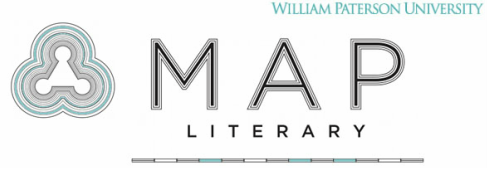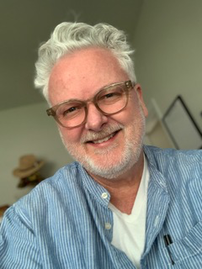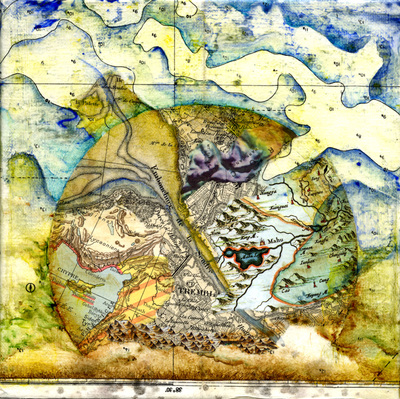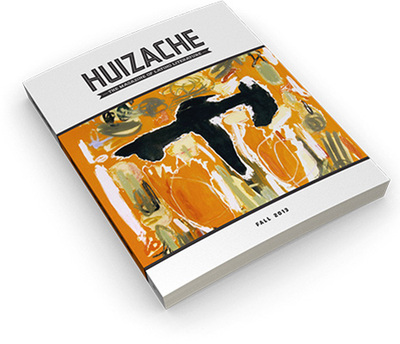WM. ANTHONY CONNOLLY
IGY
I’m on my way from misery to happiness today. Uh-huh, uh-huh, uh-huh …
… & I say you and this beautiful ache, all this vibration of strings seen and unseen. I will probably be staring off into space or at a painting, while listening to the still, small voices and crescendos inaudible through my ear-buds to those passers-by. Oh-a-whoa you got the best of my love … oh-a-whoa …
I’m a million different people from one day to the next …
We get to carry each other, carry each other. Like a river running through the year of the cat …
… or maybe in an atonal Morton Feldman dream; only to be enraptured by Iggy Pop, chased by Shostakovich, or by some mad cellist or the Lounge Lizards. Shuffling from Monk to Trashcan Sinatras; some megalomaniacal pianist moving, variations upon variation, Marsalis along before being segued into physics lectures via podcast. Still: I am searching for you. That is partly why I go to art museums, which are, in my estimation, the best places in the world. I lose myself there, crumbling into dust, surging forth in thrumming waves. And when I do …
[the tachisme of infinitesimal particles]
- Jackson Pollock, American, 1912-1956; Convergence, 1952; oil on canvas; 93½ x 155 inches; Albright-Knox Art Gallery, Buffalo, N.Y.
[a hurried murmuration]
Mixing equal parts memory and desire, I recall, or want to recall with much certainty that, as a child, I felt I was being followed and observed. Of course, at the time, I had this inkling, but could not actually put it into words. The power of language was still inchoate in me. The images, perhaps even now, as they flicker in my mind, are borrowed from the horror movies I loved as a child, and still do. The situation, this sense of being followed, observed, was not that I felt a need to scurry off screaming and crying about being stalked by a wraith, or that said stalker was green and sported gyrating antennae. We are not talking delusion. At least I am not. It was somewhat pleasant and interesting. But with some rational distance, I have come to recognize that while the possible sight of my surveyor or surveyors might not have materialized, the feeling, that tingling, that honorific glory traversing my nervous system was entirely authentic, if not fully, not correctly, attributed; even then.
Without falling into some infinite regress, I write this now speaking of a former self, contemplating an even earlier self. I write this in my forties about a memory or feeling I had in my twenties of a time when I was a single-digit scallywag. So: Thricely removed. The simulacrum is true. Writing this down does not make the regression any easier. By the time you read these words, the I-now that wrote them will have vanished and what it was will be largely forgotten, though a trace lingers, a hovering ghost, a nimbus upon these words, this paper and ink, presently surd and inert until You. You are the something rather than annihilation, a concentration, and a fusion. This is reciprocity, the kind philosopher, Martin Buber writes of in I and Thou, “I require a You to become; becoming I, I say You.”
I am because you are, and no, not an artifact of a Lionel Ritchie lyric--Say you, say me, say it together, naturally. My is-ness, really, is a water, a ripple, a wave. And it consists of movement, surface, depth, crests and troughs, continually. Ultimately, my is-ness is your is-ness.
The river
Where you set
your foot just now
is gone--
those waters
giving way to this,
now this
My admission of being followed and observed supersedes this reciprocal exchange. As a child, I actually thought--did not think true, perhaps my I-now rationalizes, but did not want to discount it entirely then--people in white lab coats stood behind one-way glass or other such tricky partitions, observing me in an elaborate experiment with this little boy as their subject. These scientists clutched clipboards, jotted down notes, conferred. It was my very own IGY. My aurora and seismic activity was monitored. Everything I did or said was recorded in their dossiers of me and these files, typed in smelly dark ink (and carbon copied) were secured, bits of my story sequestered ultimately in clandestine vaults deep in the ground in obsidian file cabinets running to infinity. Militia in drab olive uniforms, sitting erect and alert patrolled regularly in drab olive Jeeps. This is all I-now you understand; the feeling was I-then, but my description is all I-now. I found/and find it interesting because, as we all know, we cannot know ourselves wholly; a reflective surface of a myriad kind is required. This is accomplished with a team of observers, or I might suggest, by the manifold selves, an infinite Aleph or four-face Ezekiel, examining the contemporary I. So I imagine this personal IGY--an expanse of time when outsiders observe and catalogue you—as exhilarating, a little unnerving, but ultimately enlightening.
In 1952, Lloyd Berkner, a National Academy of Sciences member, proposed observing the earth and all its physical attributes for a six-month period. The program was suggested as a quantitative check up of sorts. The International Geophysical Year (IGY), as it became to be known, was modeled on the International Polar Years of 1882–1883 and 1932–1933, and planned to allow a team of international scientists from sixty-seven countries to engage in a series of coordinated observations of various geophysical phenomena—tectonic plate motion, examination of karsts, aurora and airflow, gravity, solar activity, seismic readings, examinations of the shape of the earth, and so on.
My covert scientists were aided by a crack squad of field agents, or my thinking--at some nebulous point in time of my is-ness--was that it was one cunning spy adroit at masquerade. Regardless, these were shadowy figures, spies in black raiment, adept at being obscured by velvety rain-drenched trees and eaten by numb shadows off my periphery. Sometimes I caught brief glimpses of them attempting to be nonchalant, speaking into their cuffs or feigning to dialogue with themselves, as they passed by me in a hurried murmuration. Oh-a-whoa you got the best of my love … oh-a-whoa … They dressed like grocery store clerks, or housewives, or milquetoast neighbors hosing rhododendrons or pliant priests kneeling down on creaky knees to tweak me--St. Anthony St. Anthony please come around, something is lost and cannot be found —some slept in the alleyways; others rode by on not-so-inconspicuous ten-speed bikes. These spooks evaded capture, however, not one could be brought in for questioning, and no resolution of the kind I had seen on “Voyage to the Bottom of the Sea” or “Star Trek;” the ghosts, my retinue of empiricists, transmigrated with creeping normalcy into innumerable reassignments. And I forgot about them and their stealth. As if I had been brainwashed.
[one story told by infinite tongues]
- Willem de Kooning, American (born Netherlands), 1904–1997; Gotham News, 1955; oil on canvas; 69 x 79 inches; Albright-Knox Art Gallery, Buffalo, N.Y.
[taking notes]
Apples and oranges, perhaps: Nevertheless, a day in the life, then, at the very least, a composite of days; impressionistic, but illustrative so you get to know your guide. Henri Beyle, the late-blooming writer known as Stendhal, writes in Memoirs of an Egotist of one particularly boring St. John’s Day— 24 June, 1832, which begins shortly after rising at ten in the morning. A half hour later, Stendhal is at the Cafe de Rouen. There he meets two people, one a baron and the other a relative, a cousin, neither measuring up to Stendhal’s intellect. He writes. “Unfortunately, these two beings understood absolutely nothing of the theory of the human heart ...”
June 24, present day. Blooming or otherwise, I rise earlier than Stendhal, with my Chihuahuas, usually just mere moments following the sun’s ascent. The dogs need feeding and ushered out the back door to do their “business” and back inside to be praised. My little sisters, the birds, much bounden are ye unto God, your Creator, and always in every place ought ye to praise Him, for that He hath given you liberty to fly about everywhere, and hath also given you double and triple raiment; moreover, He preserved your seed in the ark of Noah, that your race might not perish out of the world; still more … I get the newspaper--if one has been delivered--from the driveway and pour coffees for my wife and me. I return to bed to spend a few minutes with Dyan while she gets ready for her commute into work. We listen to NPR, arrange gym schedules, and exchange spousal affirmations. By then, the CHIs--collective noun for our dogs--are burrowed beneath the bed covers asleep, bellies full, having both chewed through some marrow, and their tiny bodies are throbbing warmness--propinquity, the most beautiful word Michael Ondaatje told me--tea-spooning my loins. When Dyan leaves for the day, I rise and go into my office to work, which can consist of many things: Reading and answering e-mail; journaling; work/writing for some time on a long-term project; listening to music; and later, after their morning snooze, dancing in a trance around my barking CHIs. Or the work simply consists of an extended period of staring out the window. I spend unhealthy, wasteful really, amounts of time interfacing with friends over social networks like Facebook and Twitter. But “friends” is a loose term. Author, Kurt Andersen, fashion icon, Karl Lagerfeld, techno musician, Moby and former child star and now children clothes impresario, Soleil Moon Frye are counted among those I converse with on a daily basis—it is conceit to be sure. Milan Kundera “friended” me on Facebook, for pete’s sake.
This is an off-season schedule, you understand. Normally, I might get away with some work in my office, some dancing--a trait I inherited from Mum--but the morning does not stretch out in any length before I have to skedaddle off to campus to teach freshmen. First write out a thesis, and check to see the thesis is at the very least contestable (one way to test this is to attempt to write your thesis in the complete opposite way you feel about the issue – if you can, good; if you can’t, rewrite the thesis). But for the off-season, I have greater flexibility. One thing is for certain: I do not stray far or much from the house during the summer, preferring, mostly, time alone to write and read in the comforts of my own home. But if I do venture out, a la Stendhal, it is either to an art museum to be lost in paint or to a park to smoke a cigar and write in my journal. More likely, though, I drive to a coffeehouse, one that I have completed some reconnaissance on to ensure its popular with writers, students, merchants, assorted miscreants, and a contingent of blue collar workers; I am not terribly interested in going for coffee to sit by myself or to sit on the fringe of a farmer’s collective yammering about crop resistant pestilence. Nor am I interested in being an inundated stitch and bitch covenant drone. Usually at the coffeehouses I frequent, regulars sit in front smoking and discussing the topics of the day--a war, the latest Hollywood blockbuster, Harry Potter, entropy, spatial-temporal anomalies, and other such things. Also gathered here and observed are people far smarter than me, invariably playing speed street chess, their water-logged and well-thumbed copies of Infinite Jest or Being and Time placemats for smoldering coffee, cigarettes and lighters. Pieces move expeditiously and trash talk streams like running Tweets--“#speedchess @whereisbobbyfisher castles big whoopdedoo like you couldn’t see that coming for miles” —or news crawls one finds on TV. Although I do sit out front from time to time, reading or taking notes, smoking my pipe or a small cigar wedged in the side of my mouth, I rarely take part in the discussions. I know a few of the regulars by name, greater still the number of patrons I know by face alone. I keep to myself.
[suddenly]
- Arshile Gorky, American, 1904-1948; The Liver is the Cock’s Comb, 1944; oil on canvas; 73¼ x 98 inches; Albright-Knox Art Gallery, Buffalo, N.Y.
[Lethe poured straight]
Stendhal writes that marriage kills the conversationalist. Wits grow “languid,” with matrimony, a process he says he can see all too clearly in the countenance of his cousin, the one he finds drinking coffee at Cafe de Rouen. This might be so, but marriage did not kill the conversationalist in me, who was long ago, drowned in Lethe poured straight from a pint of tarry stout. Stendhal imbibes in a cup of coffee, and two brioches later, the memoirist leaves the cafe, walking with the baron returning to work. Once the baron is gone, Stendhal’s overwrought mind gets the best of him, and in the day’s sweltering heat, grows irrational as he contemplates love lost. “Since I could not forget her, would it not be best, I asked, to kill myself.” I too asked the horrid question, though I have long forgotten the reasons why. We are adept at hiding things from ourselves.
[two-fisted misery whip]
I have never been much of a sober conversationalist; my past as a binge alcoholic made sure of that. When I was drunk on stout and whiskey, I could talk myself through many a philosophical and eschatological argument. Every conversation under the influence is held to be of the utmost importance, and the stories one boozer must tell in order to get laid or another drink creates a stinky, slobbering Scheherazade. My loose lips maligned many, injured several, and burned too many to count. I was one of those happy drunks, one only too happy to crack wise and inebriated at the expense of others. My tongue became a weapon, a two-fisted misery whip--scotch and stout--cutting a swath through the bramble. I washed my brain with whiskey from the sixteen men of Tain. Years of abuse, perhaps, of speaking so much and so loudly about nothing at all, has somehow damaged me, ruined me from holding so-called normal intercourse much the way my uninhabited wiles ravaging bars and pubs killed forever my sober self setting foot in them again or sitting alongside gin blossomed-piss tanks without sanctimonious ire. As a drunk, I could talk to anyone. As a friend of Bill W now, I share myself only with those who know the sober me. And this could only be an excuse as to why I find conversation with strangers, beyond pleasantries, to be arduous; why even acquaintances can register in me little need to strike up a long conversation. This is not to say I refrain from lengthy diatribes with friends and family, I do on occasion—but more often, not. Each time I meet someone, I find for a split second that I am somehow without the ability to formulate words; my mouth does not seem to work. Through lack of practice, I have lost the art of it. I stammer, or speak too softly; I have not the faintest idea what I should say. When I do speak, it is to say something odd or awkward. I think I am being followed. Or I go blank [ ]. It might partly be a symptom of our age of increased transience and a lack of regular face-to-face interaction, after all, part of my morning is spent staring into a computer monitor with my friends the pixels. I will “speak,” more freely and openly with someone on-line than I will in person.
Something is dying; my mouth holds great entropy, I almost gag on the iodine. My pockets full of nothing, but mumbles. Not that I have ever found talk to be laudable—for the most part, talk is small, asinine, and time wasting. I never crave conversation, but I do find, even though I am a loner, an introvert, INFJ (inner nuances foster journeys), I need to be amongst people, to hear their chatter. Unlike Stendhal, I go out for coffee to observe and to be largely quiet, a confession of a modern-day opium-eater, I suppose.
[lonely room]
Back to his memoir: Escaping the heart and his thoughts of suicide--sincere or not--Stendhal purchases some of Shakespeare’s plays--thirty sous each—and returns to his grotto to read. Perhaps: Give every man thy ear, but few thy voice/Take each man’s censure, but reserve thy judgment. Or perhaps: I will weary you then no longer with idle talking. Know of me then, for now I speak with some purpose … But the bard is not enough company. “The inside of my lonely room was dreadful to me,” the memoirist writes. He is driven from his room at five back into the urban landscape of table d’hote characters including “elegant subalterns,” “prostitutes of the highest order,” and the “smart bourgeoisies.”
[lying]
The constant contradiction is at the heart of idle chatter, the contrariness prominently expressed to mask what is meant or understood. “The simplest and most stable forms of irony rely on the audience or hearer recognizing that what the speaker says cannot be what (he or) she means,” Claire Colebrook writes in Irony. “And this is because in order to speak at all we have to share conventions and assumptions.” But what is becoming increasingly difficult is to share those conventions and assumptions, and even then to have the ability to recognize the level of irony deployed. If one is not in the speaker’s community, one would be hard pressed to recognize much. We share so little now. So we speak in code, and alienate anyone outside of particular spheres. In this isolation, conversation is stifled and so with it goes any sense of communal responsibility--which I might very well contribute to myself—the supreme motive, I believe, behind irony’s Gordian knot. It allows speakers and writers to avoid responsibility. Oh that is not what I mean at all. Or, if meaning is obtuse, or poorly executed, claiming irony becomes its salvation. Being aware of this, and perhaps not being adroit at its use, I find communication today to be little more than a card game of micro-tells. If we do not say what we mean with any sincerity, we lie. But perhaps that is the way it is supposed to be. “Lying is what makes me a man,” says that rapscallion, Razumikhin in Crime and Punishment. “Not one truth had ever been reached without first lying …” he says in Dostoevsky’s classic, “… Lying in one’s own way is almost better than telling the truth in someone else’s way.” But of course, Razumikhin is stone-faced drunk.
[faro punter]
After escaping his room and having dinner at local hotel, Stendhal reports he enjoys conversation and coffee until ten that evening. He then excuses himself, and heads over to Mme. Pasta’s for faro, a card game popular in France in the author’s time. As a faro player, or punter as the participant is known, Stendhal is rather poor. “I lost more than I had in my pocket.”
[the last elephant]
On the IGY lecture circuit, Dr. Lloyd Berkner talked about elephants.
He relates the story of a young man driving much too quickly through western Massachusetts. The young man was going well over one hundred miles an hour when he came over the crest of a hill and saw a village ahead. Berkner said the driver did not think that he could slow down in time so decided to keep his foot on the gas pedal and to be through the small village in no time at all. But, as the driver was speeding through the village and came to a crossroad, there in front of him was a train, a train of elephants—a circus parade. There was a series of elephants marking down this crossroad, each one holding the tail of the elephant in front of him with his trunk. Berkner continued, as this fellow approached the crossroad, he thought he would just clear behind the last elephant, but, just as he got there, a baby elephant appeared from behind the church holding its mother’s tail.
The car ran right into the baby elephant, caromed off, and ended up in a nearby culvert. As the young man was climbing out the smoldering mess of his car, the circus manager approached him.
“You owe me $100 grand,” he said into the young man’s face.
“For a baby elephant?” the incredulous young man asked, still shaking from the accident.
The manager replied, “Baby elephant, hell! Don’t you realize you pulled the tails out of six elephants?”
Studying geophysics, Berkner explained, is an exercise in interconnectedness, pull at one thing and other things happen. Like a river running through the year of the cat…now this,
[soaring like paper airplanes]
I know now that almost everyone wonders about this stuff sooner or later, and no matter what he or she is doing, but one of the sundry blessings of being thirty, forty is the conviction, sired by many years in the trenches, that nothing exactly like this, all evidence to the contrary, has ever happened to anyone before.
My inability to connect with people, my excursions to coffeehouses and art museums alone did not materialize out of thin air; it is more of that creeping normalcy, a condition or situation that changes ever so slowly, but persistently, the transformation complete before you recognize it. I feel so utterly alone in this. When did this happen? Of course, I gave up booze and meat well over a decade ago and life goes on and you change, but I always thought I would have friends and family around. Geography makes for odd family relations. It is all in the mail or on the telephone. But friends, friends like the kind I had growing up or the ones in university or first jobs, they are just not materializing. And it is for lack of trying, I am afraid and I am trying to figure out when this happened, when I decided not to pick up the phone, not to return the electronic messages, the gestures, the offers. Now since it has transpired, it seemingly cannot be undone and I am sunk: Without a friend in sight. That is cruel and untrue, of course, but fairly honest. I have friends, but either they are restricted to locales and occasions or have become as inaccessible as me. Why, I can only hazard to guess. They have their own transformations to contend with, to figure out.
INFJ, a therapist told me en route to sobriety: Inner nuances foster journeys.
What might work is a gigantic gathering where we all convene to explain why we never get together any more. But the whole shebang would be messy and ugly, and I am tired of those kinds of things, now; now I am this new me, this me without friends. The snake swallows its tail, I know, I know. See?
I have long held the fantasy that I will one day knuckle the sleep from my eyes and find that it has been all a dream and everyone will be there, and we will all be laughing and crying and carrying on. Our bodies are sun colored and immaculate; our souls soaring like paper airplanes. And I will be there too, off in the corner as INFJs do, and stricken with an amazement that buzzes the bones, hanging onto you, to something that was there in the beginning, and you or it tell me what to be on the lookout for, pointing and squeezing me in tighter. And you tell me it began like this—
[ ]
… and it ended in absence.
[hunting and pecking]
Dad is writing a memoir in broken teeth. iN mYo ut h. It worries me--not the broken teeth, because that can be explained by simply watching my father type with two rather large hammer-battered fingers--but because it foretells death. In death, responsibilities begin. In death, we begin with a fresh retelling of our own stories, our own final narratives. A circling back. Our own monomyth. I remember listening to stories of Uncle Jerry’s childhood. Jerry was my wife’s favorite uncle; he was a real jokester, one of those old style of men so now long out of style: Traveling salesmen with fresh after shave and a Frank Sinatra drinking style. Leather slippers. Pull my finger. He was a good man, a good father. A real storyteller. But the stories were never about him; they were always anecdotes or cautionary tales, ways of telling us the rules of life ahead. (I have since come to understand that is our charge to die well in order to serve as an example). We were young and impressionable. I think it might have been a Christmas dinner or some other kind held at my wife’s Auntie Claire’s rococo house. Cousin Carol and her Latin acoustic guitar playing lover, Rodriquez would be there; my in-laws, Bev and Finn would be there and also John, the family’s saddest story (during a hockey game, his father standing up to cheer his son scoring dies of a heart attack; John quits hockey forever. Today, he lays tile). Auntie Claire was an out-of-focus, real estate maiden with a great little laugh and hair that used to be summertime blonde. She was a good host. Drinks all around in a comfortable home. Uncle Jerry was sitting in the living room holding court, as he usually did. What was unusual were his stories. They were about his childhood. It was as if--life passes before your eyes—the film depicting the story of his life was slowly unspooling. He was surely dying. He did die some months later. Perhaps it has something to do with getting your house in order, getting everything lined up to pass through the eye of a needle that stitches up our time here. He was getting ready to pass through.
So this worries me. Dad has begun his own ordering; repeatedly, groggily. He says he lies awake at night or early in the morning and his brain is firing away memory after memory after memory ... of childhood in Scotland during the war, when his own parents were alive and taking care of him, and his brother, Kevin. This worries me because Dad is over eighty. He cannot double his life as I might mine; life expectancy tells us Dad is ready to pass through. Is he getting his house in order?
To me, it suggests that for everything, even those things that we have no control over, there are steps, a process. The broken teeth are the way he is hunting and pecking through the catacombs of this childhood. Two fingered inquisition. Two fingers testing the winds. It was something he had always said he was going to do, like finally cleaning out a closet or the garage. It was something talked about, but in all seriousness, never really attempted. After all: There was time, was there not?
I have come to believe we do not live in a narrative where things happen, and when they do, they advance some uniform address of existence. It is all rather random and chaotic at times. Narrative is what we place on our lives later.
Once upon a time.
As with any narrative, we should begin at the beginning. Once upon a time a child was born. Thus begins story. It is a process. Pull an elephant’s tail. Narrative progresses one step to the next, in chronological order from point A to point B, to C in a long causal chain. We live in the fragmentary, the episodic, the inexplicable; everything converges and diverges undulating of its own free will from moment to moment. The links we devise later upon reflection, and with some years of distance. So the old get to suddenly begin to piece it all together, to get their house in order, to say what needs to be said. It is a way of getting out the process for others. When we die, we first recall. If time allows. We guide.
If time allows we first recall what, but the narrative—that is our lives. The many lives we live, placing one foot in front of the other, holding on to the one in front, pulling the one behind.
[stone angels without wings]
I do not always understand what I feel.
Recently, I came out of the Saint Louis Art Museum’s exhibit on impressionism, and I stood briefly on its impressive stone front steps overlooking The Great Basin, the site of the 1904 World’s Fair, and froze, inert. Behind me were the twin stonework sentinels, reclining larger-than-life statues of white rock representing the art of painting and sculpture at the entrance of the museum. The statue representing Painting is missing fingers, long ago chipped off, while Sculpture, holding sculpting implements of some kind, stares off with its smooth orbs into the infinite negative space. They wing me like guardian angels. They are stone angels without wings. As I stood there, I was overcome with an unidentifiable feeling: A thrill, some ancient ache, half recognition as if a curtain had been momentarily parted and somehow this filled my body with a pleasant electrical charge. The swiftest of thoughts coursed through my mind and marrow. Was it the past, my past being, intruding—playfully, involuntarily—on my present moment of being? I-then tapping I-now’s shoulder? Had the push and pull of color, the drips of paint, the zip and abstractions I had witnessed on those hung canvasses and those multifarious sculptures induced a part of me to sluice beyond eloquence along time’s continuum? I shook the feeling off enough to get in my car. I drove to a nearby coffeehouse, one vehicle in front of me in traffic for the short trip, its vanity plate reading: WhereMI.
[stained with blood]
- Mark Rothko, American (born Russia), 1903-1970; Red, Orange, Orange on Red, 1962; oil on canvas; 91¾ x 80½ inches; Saint Louis Art Museum.
I thought I did not need anyone. Narrative needed only one chief character. Paintings were all the same for every viewer. I could be alone, be left alone in sobriety, with my cloak of sin and shame of what the drunk had done. I hurt so many people, severed so many ties my hands were permanently stained with blood. It began when I was sober, yes. But only when I came to be in the presence of absence, looking down into the coffin of my older brother, Kevin, who died just over a decade ago, and wondering, what now, then missing his love, then coming to know this life, and then …?
I turned, and turned again. And felt something in the pit of my stomach: Emptiness. My odd spine curled, and I felt this space inside me then, not as empty but neither full. Neither moving nor still; neither roaring nor silent, beyond the weak instrumentation of words.
[someone is looking out for you]
Kevin had died unexpectedly in 2000; his wracked body lay secreted in his hotel room for three days before discovery. Then, just this past winter, somewhat suddenly, Mum passed away at seventy-seven with lung cancer, which had silently, incessantly, installed itself into her breathing for the smoke she ate, quietly ate her. The person before me, the one to embody all that my future self would come to incarnate; the person who created me, who brought from her womb, who ushered me up—both gone.
At the coffeehouse that day following my trip to the museum, I wrote notes on sticky Post-Its.
You are remembered.
You are loved.
& I say You.
Someone is looking out for you.
I rolled the notes up in tight tiny scrolls and hid them.
It is an old habit, with one of two possible explanations for its origin. I had been in the library at my university; it was 1983, and I was wandering aimlessly through its stacks, looking but not looking for assistance with Emile Durkheim or Max Weber. I was killing time. Awaiting the magic, the kind fresh young students hope for, to write papers or file away badly needed exam data. In one tight stack aisle, in amongst the dusty tomes, my eye caught the spine of a book pushed out slightly ajar from the plain. I could lie to you and tell you what the book title was, but I honestly cannot remember. I do remember, however, pulling the book out and how I was satisfied with the release of it into my hands as it left the confines of its neighbors because these are affections I can easily reconstruct today. A note on crinkly white paper was sticking out the top of the book stuck within its leaves. I gingerly opened the book where the note had marked. The tenor of the note was personal; I can still feel my viewing it as an act of invasion of privacy, even though the note was in the spine of a readily available, university library book. It was as if the note-writer had known its intended audience would discover the missive. But the note was talking to me. At least it felt it was. I remember standing there thinking, who could know such things? I looked around, thinking perhaps I was being watched. I slid the book back into its satisfying space on the shelf and left it slightly ajar. That night, or thereabouts, I was returning to my study table in some distant library wing when I noticed —but was not noticed—an old high school classmate, one I had been particularly mean to for no good reason other than I had the power to do so. I went back to my table, tore out a piece of foolscap, and wrote a note to this former classmate, apologizing for my terrible behavior toward them. I signed the note. When I returned to where she sat, the classmate had gotten up, but left behind her books and so I stuck the piece of paper into one of her books, and left. From that day forward, my trail of notes has been wide and voluminous.
This habit might have also been the result of meeting Thom J. in the first grade. His scroll, however, was one of those newspaper end rolls covered in crayon drawings he brought for show-and-tell; he never hid it though, so that might be apocryphal on my part. But he does come to mind.
I am forever leaving notes for myself too in the cracks of books, mostly to the point now where I am often quite surprised when something emerges from a book I have pulled from my personal library stack. Out it flits and I bend down to retrieve it three-quarters full of anticipatory glee and just a smidgen of dread. Often innocuous, sometimes sublime, the notes are like letters from my I-then to my I-now. Months, years, might have lapsed since I had written the little pieces, and some of them have the power of expression that I do not remember having; there are notes I do not recognize at all as coming from me and then there are notes that I clearly identify with then and now. And it makes me wonder whose performance am I watching? How many people am I? Who am I? What of this space between these selves? What fills the space between? It is as if I am one thing one moment and something rather different the next. I forgot myself, sometimes, these notes say. I forget me, I forget you. So, it continues …
I picked up the habit again in earnest around the time of Kevin’s death. I like to feel my wake is littered with these fluttering affirmations, and that people, regardless of station sinner or saint—find them when they need them the most. Like grace. I stick notes in book spines and leave them on bookstore shelves and movie theater seats. In outstretched tree limbs, at the feet of stone statues, in bathroom stalls, and shopping malls little secret notes. I leave them for you.
I sat for a moment back on my chair and looked around at all the people in that coffeehouse. All those you-s. Who was looking out for all of us? Us sparrows, us creatures? Did we all have our own personal IGY? Why did I feel this inexplicable quietude in my gut? Why did their deaths, first Kevin’s in 2000 and then Mum’s bring me here, in this present moment, such ineffable love and knowing in their absence, my soul neither destroyed nor without dent, neither tethered nor weightless; filled with neither utter appalling blackness nor suspended in blinding blankness. Just where was I? Love is not an exclusive characteristic, but it is a characteristic by which or in virtue of which you exist for others. And so I did not feel at all alone, as I sat alone with others on a day just like today because You were there, and You, and You, and everything built up and indistinguishable. I could not; I would not do this alone. For I knew--
The spy is back.
Oh-a-whoa you got the best of my love … oh-a-whoa …
I’m a million different people from one day to the next …
We get to carry each other, carry each other. Like a river running through the year of the cat…
I am looking for you, for You.
& I say You.
Copyright © October 2022 Wm. Anthony Connolly
|
Wm. Anthony Connolly is the author of four novels The Jenny Muck, Get Back, The Obituaries, and The Smallest Universe which was published in 2021 by Propertius Press. His debut poetry collection, Psalms & Stones, was published in 2019 by Spartan Press. His work has appeared in The Rumpus, Intellectual Refuge and Elephant Journal to name a few. The personal essay "IGY" is from his forthcoming book, The Eight Leaves. He lives on the Delaware Peninsula with his wife Dyan and their two dogs, Hemingway Short Story and Professor Leo Tolstoy.
|










